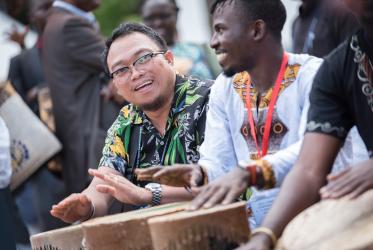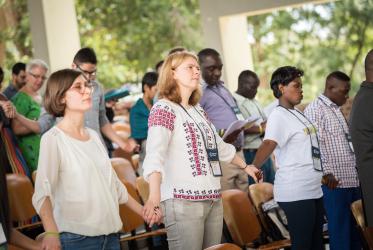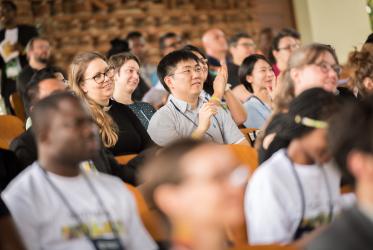Each year students from all over the world arrive at Bossey near Geneva for a three-month language training course to pave their way for ecumenical studies that follow on straight after.
“The title captures the goal of the course,” says Father Lawrence Iwuamadi, the Nigerian priest who studied at the Pontifical Gregorian University in Rome and is academic dean of the Ecumenical Institute.
It is “English as a Tool for Ecumenical Formation: Intensive English Summer Course” and its graduates have now joined the Certificate of Advanced Studies (CAS) and master’s programme at the institute.
“This English course is done with a focus on ecumenical formation,” says Iwuamadi at the institute that has inspired students from all around the world who come to learn about those from other Christian traditions.
“Between June and September, a group of students comes to Bossey to learn English as a gateway into ecumenical formation. It exposes them to ecumenical vocabulary, concepts and ecumenical visits to institutions such as to the International Red Cross and the UN which are part of the course.”
Christine Housel has many years mentoring young people and runs the English course for the World Council of Churches (WCC) institute which this year has drawn men and women in their 20s and 30s, from a global spectrum of Christian traditions.
“This year, we have 13 students who come from lots of different countries and church traditions. Their experience with English varies tremendously,” she explains.
Talking to one another – in English
Some are ordained, some lay people, all wanting to learn more about the Christian family and using the English language as a tool for ecumenical communication. They constantly mix and talk to one another – in English.
“We do a language assessment at the beginning,” says Housel. Two groups are then formed, “so that they can support each other in the best way.”
Some of the students gave impressions of the course before embarking on their deeper ecumenical formation.
Nu Ra Aung, a Kachin Baptist Convention minister lives in the remote northern area of Myanmar near China in a town that has a majority of Christians among the Kachin people.
She ventured south to the capital Yangon for three years of study at the Myanmar Institute of Theology.
“I lead a programme of Christian Education for our church as a minister working with a pastor. I am not ordained. Our society does not ordain women,” said Aung. “I thank God I can study here. I had no English studies at school.”
Protestant recommends course to Catholic bishop
Also from the region, Voarapa Limprasutr is the first Thai Roman Catholic to join the English and CAS course, recommended to her bishop by a Protestant woman. She studied some English at university, while majoring in psychology, but seldom used it.
“The English course is specifically about using the language in the area of religion and ecumenical matters and we have to write a research paper. So this is very useful. It has vastly improved my English and my knowledge of ecumenical matters,” said Limprasutr.
Egyptian Presbyterian pastor, Mark Soliman Mounir lives in a town near Minya, some 245 kilometres (152 miles) south of Cairo on the western bank of the Nile River after completing theology studies in Cairo.
“I find it very comfortable here in Bossey, in the peace and quiet of the countryside,” he said.
“My biggest problem was speaking English fluently. I feel I have improved a lot. But of course, I still have a lot to learn and I want to study for a PhD in theology about doctrine, and this will also help that.”
Studied Chinese literature
Qi Sun, a Protestant researcher from the China Christian Council, has a Ph.D. in Chinese literature and has even braved reading the American novel Cold Mountain during the course at the encouragement of course instructor Christine Housel.
“After the course, I would like try to help the China Christian Council pay more attention to the ecumenical movement and to connect Chinese culture to it.
“I want to learn to speak fluent English. It helps with communication and especially with the ecumenical movement. I am so grateful to the WCC for giving me this opportunity to learn about worldwide Christianity,” said Sun.
Then, Mitrofan Oleksi Bozhko, a priest from the Ukraine Orthodox Church (Moscow Patriarchate), is a historian at the Kiev Theological Academy and Seminary.
He has two PhDs – and wants to complete a third one, now in ecumenical theology.
“Of course I want to try to improve my English and when we start ecumenical theology I will need vocabulary as there some issues we don’t discuss in our churches that we do here, such as gender and others.
“We have the opportunity here to speak and meet people from different cultures and learn about conflicts in different countries. Here from our discussions, global problems become more understandable,” said Bozkho.

“It’s good to learn English like this because it is an international language. Before this course, I could not speak English. I will take what I have learned from different cultures and religious experiences and share them at home,” she said.









